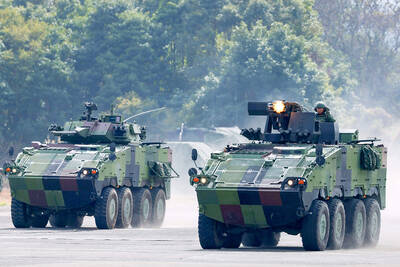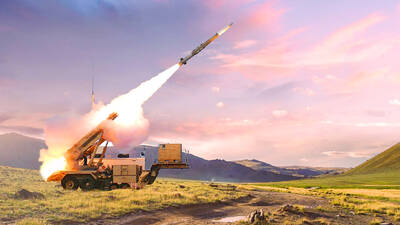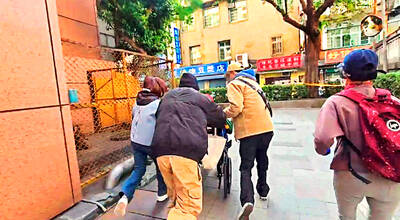The debate over whether Taiwan's liberal laws on abortion should be amended to impose a compulsory waiting period for women seeking abortions was originally scheduled to be debated yesterday at the legislature, with three competing versions of an amendment to the ninth statute of the Genetic Health Law (優生保健法).
The meeting however was canceled due to a lack of legislators.
The version of the amendment sponsored by Chinese Nationalist Party (KMT) Legislator Yang Li-huan (楊麗環) and others emphasizes "family values," "the fetus' right to life" and abstinence-only sex-education for young people.
An amendment sponsored by Democratic Progressive Party (DPP) Legislator Lin Tai-hua (
Both amendments support a six-day waiting period for those seeking abortions, after an initial consultation with a counselor.
The third amendment, spon-sored by DPP Legislator Huang Sue-ying, (黃淑英) however, does not include a waiting period, but would create an insurance fund to help women cover some of the costs related to abortions.
Yang, the only amendment sponsor to attend the legislature's Health, Environment and Social Welfare Committee meeting yesterday, said she and Lin supported each other's amendments.
"We agree on the importance of the sanctity of life," Yang said. "But my amendment focuses more on teaching young people early on the importance of maintaining their chastity, for both men and women."
Huang, however, attacked the other two amendments for "disre-specting" a woman's autonomy.
"If religious groups want to spread their values, they should prosyletize, not force the rest of us to go along with their morals by pushing through legislation," said Huang of Yang's amendment, which she said was colored by religious beliefs.
Huang also had harsh words for Lin's amendment, which mentioned low birth rates as a pressing problem for Taiwan while recommending a six-day waiting period.
"We should not be manipulating female bodies every time we need to raise or lower the population," said Huang, adding that abortion was originally legalized in Taiwan with a view of encouraging a lower birth rate, although birthrates started to decline before the law went into effect.
"The real reason that women are not willing to have kids is that the burden on them is too great. You see this in all countries with traditional Confucian values ... The solution is greater gender equality and more social support," Huang said.

Taiwan must first strengthen its own national defense to deter a potential invasion by China as cross-strait tensions continue to rise, multiple European lawmakers said on Friday. In a media interview in Taipei marking the conclusion of an eight-member European parliamentary delegation’s six-day visit to Taiwan, the lawmakers urged Taipei to remain vigilant and increase defense spending. “All those who claim they want to protect you actually want to conquer you,” Ukrainian lawmaker Serhii Soboliev said when asked what lessons Taiwan could draw from Russia’s invasion of Ukraine. Soboliev described the Kremlin as a “new fascist Nazi regime” that justified

The US House of Representatives yesterday passed the PROTECT Taiwan Act, which stipulates that Washington would exclude China from participating in major global financial organizations if its actions directly threaten Taiwan’s security. The bill, proposed by Republican US Representative Frank Lucas, passed with 395 votes in favor and two against. It stipulates that if China’s actions pose any threat to Taiwan’s security, economic or social systems, the US would, “to the maximum extent practicable,” exclude China from international financial institutions, including the G20, the Bank for International Settlements and the Financial Stability Board. The bill makes it clear that China

‘T-DOME’: IBCS would increase Taiwan’s defense capabilities, enabling air defense units to use data from any sensor system and cut reaction time, a defense official said A defense official yesterday said that a purported new arms sale the US is assembling for Taiwan likely includes Integrated Battle Command Systems (IBCS). The anonymous official’s comments came hours after the Financial Times (FT) reported that Washington is preparing a US$20 billion arms sale encompassing “Patriot missiles and other weapons,” citing eight sources. The Taiwanese official said the IBCS is an advanced command and control system that would play a key role in President William Lai’s (賴清德) flagship defense program, the “T-Dome,” an integrated air defense network to counter ballistic missiles and other threats. The IBCS would increase Taiwan’s

NOMINAL NEWLYWEDS: A man’s family and his wife — his long-term caregiver — are engaged in a legal dogfight over the propriety and validity of the recent union A centenarian’s marriage to his caregiver unbeknownst to his children has prompted legal action, as the caregiver accuses the man’s children of violating her personal liberty and damaging her reputation, while the children have sought a legal option to have the marriage annulled. According to sources, the 102-year-old man surnamed Wang (王) lives in Taipei’s Zhongshan District (中山) and previously worked as a land registration agent. Wang reportedly owns multiple properties and parcels of land worth several hundred million New Taiwan dollars and has ten children. His caregiver, a 69-year-old surnamed Lai (賴), has been caring for him since about 1999,